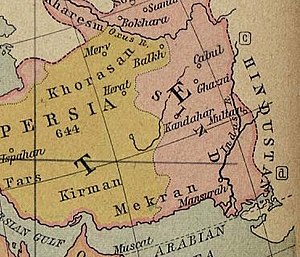Greater Khorasan
historical region in Asia
Greater Khorasan or Ancient Khorasan (Persian: خراسان بزرگ or خراسان کهن) (also written Khurasan) is a historical region of Greater Iran. It also included parts of Afghanistan, Turkmenistan, Pakistan, Uzbekistan and Tajikstan[1][2]

References
change- ↑ "Khurasan", The Encyclopaedia of Islam, page 55. Brill. 1967. Retrieved 2010-10-22.
In pre-Islamic and early Islamic times, the term "Khurassan" frequently had a much wider denotation, covering also parts of what are now Soviet Central Asia and Afghanistan; early Islamic usage often regarded everywhere east of western Persia, sc. Djibal or what was subsequently termed 'Irak 'Adjami, as being included in a vast and ill-defined region of Khurasan, which might even extend to the Indus Valley and Sind.
- ↑ "Khorasan". Encyclopædia Britannica Online. Retrieved 2010-10-21.
historical region and realm comprising a vast territory now lying in northeastern Iran, southern Turkmenistan, and northern Afghanistan. The historical region extended, along the north, from the Amu Darya (Oxus River) westward to the Caspian Sea and, along the south, from the fringes of the central Iranian deserts eastward to the mountains of central Afghanistan. Arab geographers even spoke of its extending to the boundaries of India.